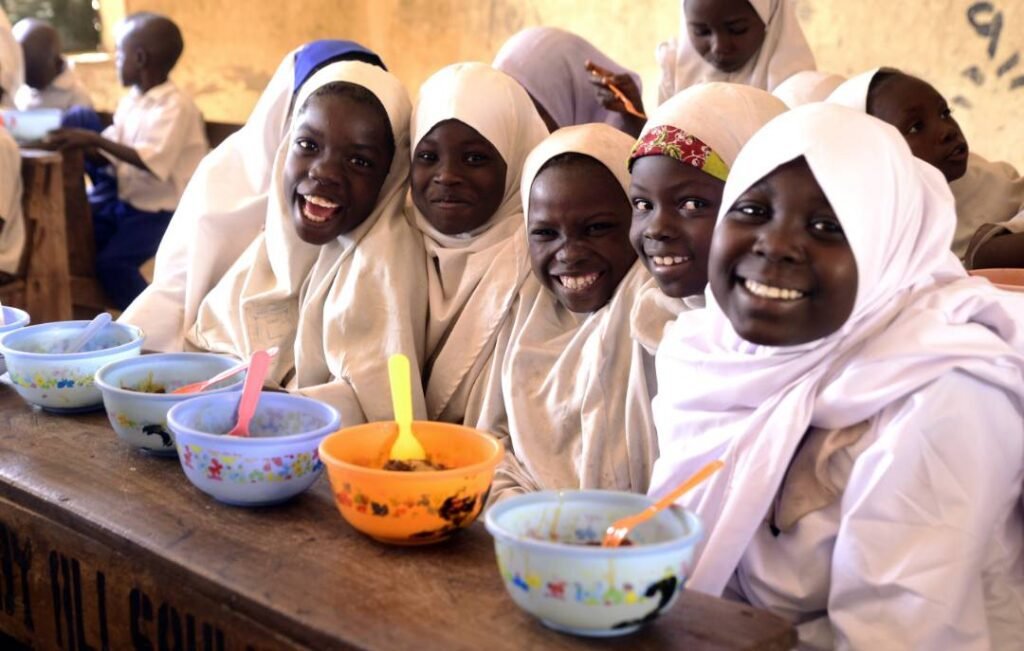MORE than nine million Nigerian pupils are at risk of continuing without access to nutritious meals, as the Federal Government’s National Home-Grown School Feeding Programme (NHGSFP) remains suspended, nearly 18 months after it was halted amid misappropriation allegations.
News Point Nigeria reports that the programme, which once supported over 250,000 jobs across food production, logistics, and service chains, is yet to resume despite a ₦160 billion allocation in the 2025 national budget.
Suspended in January 2024 following allegations involving the former Chief Executive Officer of the National Social Investment Programme Agency (NSIPA), Halima Shehu, the initiative has since languished in administrative limbo even as hunger rate skyrockets nationwide.
Launched as a flagship social intervention under the Buhari administration, the NHGSFP had provided direct employment to nearly 35,000 cooks and indirectly benefited over 200,000 individuals, including farmers, food vendors, and aggregators.
The programme covered 52,604 public schools in 30 states, serving an estimated 9 million children daily before its suspension.
It aimed to not only enhance child nutrition and school attendance but also stimulate local economies by sourcing food from smallholder farmers.
Yet, as of mid-2025, despite continued budgetary provisions, the programme remains inactive, leaving schoolchildren and rural economies stranded.
In the ₦54.9 trillion 2025 national budget, ₦160 billion was earmarked for the NHGSFP:
₦100 billion is allocated under the Service-Wide Vote domiciled with the Ministry of Budget and Economic Planning,
Another ₦60 billion is managed by the Ministry of Education for primary school feeding.
But Ministry sources told News Point Nigeria that soaring food prices, transportation costs, and logistics challenges may render these funds insufficient.
Also stakeholders fear that unless immediate adjustments are made to reflect current inflationary realities, the funds could fall short within months of disbursement.
A News Point Nigeria price survey revealed alarming increases:
A 50kg bag of rice rose from ₦26,000 to ₦85,000
Beans surged from ₦28,000 to ₦75,000 per bag
A single egg now sells for ₦250, up from ₦50 in 2021
The current meal budget of ₦100 per child per day, an increase from ₦70 may no longer provide meaningful nutrition.
Stakeholders argue that one egg now consumes more than half the budget, not to mention the cost of grains, proteins, vegetables, and cooking fuel.
The school feeding programme’s reputation has long been marred by irregularities, poor quality food, and non-payment to vendors.
One audit revealed that ₦2.67 billion earmarked for Unity schools during COVID-19 lockdowns was diverted to private accounts, raising suspicions of systemic embezzlement.
Though a review panel was established in 2024, the government has not yet released a timeline for the programme’s resumption. Efforts to get clarification from the Ministry of Education were unsuccessful, with the Press Director promising a response that never materialised.
Public affairs analyst Akinsola Olotu cautioned that the delay could undermine government efforts to reduce out-of-school rates, hunger, and youth malnutrition.
“The NHGSFP is critical not only for feeding but for keeping children in school and stimulating local economies,” he said.
“Delays risk reversing gains, especially in rural areas where families rely on the meals to keep children in class.”
With 20 million Nigerian children reportedly out of school, according to UNICEF, education advocates warn that the absence of school meals may discourage enrollment and worsen dropout rates, particularly among girls.
Michael Adaramoye, National Mobilisation Officer of the Education Rights Campaign, urged the federal government to expedite implementation.
“Despite budgetary allocations, nothing has been done. This is unacceptable,” he said.
“We call for the immediate constitution of a democratic board involving unions like the NUT and PTAs to ensure accountability and transparency.”
In August 2024, Finance Minister Wale Edun pledged to relaunch the scheme, noting its vital role in improving education and nutrition outcomes. Yet, almost a year later, the programme remains inactive.
With the 2025 academic year approaching, stakeholders warn that continued delay will deepen child poverty, derail educational progress, and hurt rural economies.
Unless the federal government urgently addresses administrative bottlenecks, inflation-related funding gaps, and issues of trust, Nigeria risks turning a once-promising social intervention into another abandoned project.







